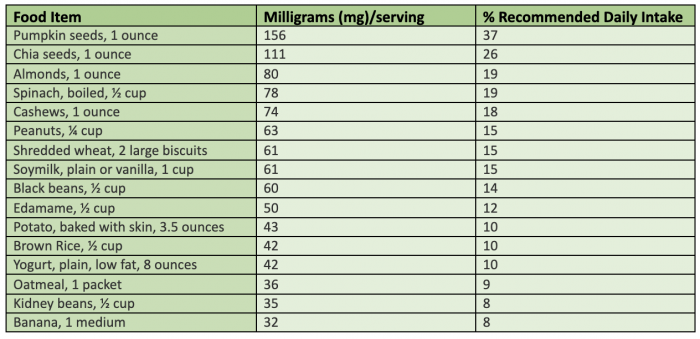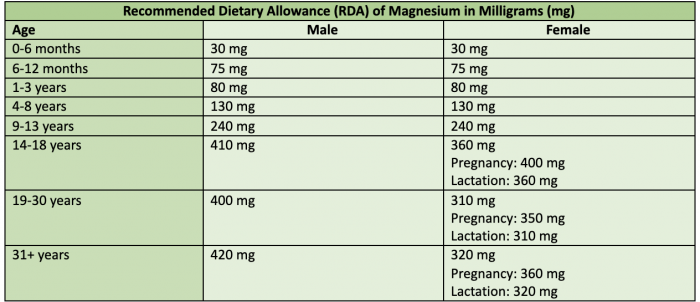Magnesium & Mental Health
This week we are back with another essential trace mineral that is fundamental to human health and well-being – magnesium!
The Basics
Magnesium is an essential mineral for humans, meaning we must derive it externally from either food and/or supplement. Luckily, it can be found almost ubiquitously in most foods with fibre (we will dive into this more below), as an additive, and in dietary supplements. This mineral is absolutely essential to human health, lending itself to over 300 systems in the body! Among these systems are the regulation of muscle tissue and function, nerve health, as well as blood sugar and blood pressure control1. In addition to these roles, magnesium is also fundamental to a properly functioning central nervous system (CNS), where it helps to induce and regulate cellular communication and signalling2. In this way, magnesium is similar to zinc – see last week’s blog post for more details on how zinc also influences our CNS to help optimize mental health!
Assessing the level of magnesium in our body is tricky, because blood tests are often misleading. This is because approximately only 1%1 of our body’s magnesium is found in our blood, while the rest is in our bones and tissue. The level of magnesium in our blood is kept within a very tight range by our body, pulling from our bones and tissues if it begins to fall. Therefore, a normal lab value may not be reflective of our body’s actual stores. Ensuring you are getting enough magnesium rich items in your diet is one great way to ensure your body has enough of this mineral for all its vital roles, unless there is an underlying absorption or digestive issue.
The Link to Mental Health
To date, several studies have shown the usefulness of magnesium in managing mental disorders as well as the link between these disorders, notably depression, and low magnesium levels in the blood. One literature review2 of all relevant data (32 studies), published in 2020, found that there was a significant correlation between magnesium deficiencies and depressive symptoms, as well as mainly positive results and improvements in depression with the intake of magnesium. The review also found a pattern of reduced anxiety scores in depressed patients with higher levels of magnesium in their body, as well as several articles reporting low levels of magnesium in participants with attention-deficit disorder (ADHD). With that said, they were unable to find a definite link to generalized anxiety disorder, as well as a consistent pattern between all included studies – which is not uncommon for research centered around nutrition and mental health! Therefore, the researchers concluded that supplementation of magnesium could be beneficial for managing these mental disorders, but that more long-term research was needed to fully support this claim.
It is unfortunate that more research on magnesium and its mental health protecting effects hasn’t been conducted, seeing as the first report of magnesium’s role in managing depression surfaced almost a century ago! In fact, in 1921 magnesium became the first medically acknowledged nutrient to be used in the treatment of depression3.
One reported mechanism for how magnesium helps to optimize our mental health is through regulating our stress response3. Typically, under normal conditions, the body activates an appropriate stress response by triggering our hypothalamus (a part of the brain) to release certain hormones that cascade into the release of cortisol, the “stress hormone”, into our body. In a healthily functioning body, the production of cortisol will then be stopped until our bodies can return back to a state of homeostasis (aka “our happy medium”). But, in events of chronic bodily and mental stress, such as in depression or anxiety, there are persistently high levels of cortisol in our body. This is where magnesium comes in, this mineral can help interfere with that cascade of events that leads to the production of cortisol, reducing the levels that can enter into our brains. However, when we are depleted of magnesium, this system is unable to respond appropriately to these chronic levels of high stress. So, ensuring we are optimizing our diet with magnesium rich foods and/or supplements could be one way to start normalizing our stress response, and optimizing our mental health!
Where Can We Get It, and How Much Do We Need?
The most concentrated sources of magnesium in the food chain can be found in plant-based items, and this is because the general rule of thumb is that foods which contain fibre also provide magnesium1. Fibre is the portion of carbohydrates/starches that cannot be completely broken down in the human gastrointestinal tract, and therefore it slows and helps improve our digestion, prevents blood sugar spikes after eating, and regulates our bowels. Examples of fibre containing foods, which are also high in magnesium, include nuts and seeds, leafy greens, whole grains, and legumes. The chart1 below gives some examples of how much magnesium can be found in a serving of some of the richest magnesium sources, and compares that to the amount the average healthy human need in a day:

Compare this to the set daily Recommended Dietary Allowance (RDA)1, which is the minimum amount required to meet the needs of most healthy people:

One thing to note is that typically only 30-40%1 of dietary magnesium is absorbed by the body, whereas supplemental magnesium is in its elemental form – therefore it is much more efficiently absorbed. Because of this, there has been Tolerable Upper Limits (UL) set for magnesium supplements, in order to avoid toxicity. The most common effect of taking too much magnesium is its laxative effect. If you decide to use a supplement to increase your magnesium intake, it is important to stick below these levels of elemental magnesium, unless otherwise recommended by a physician:

One other way you can try and increase the absorption of your magnesium is to avoid taking it with zinc, as zinc can interfere with the absorption of this mineral in our gut1!
The Bottom Line
While more research may be needed in the field of magnesium and mental health, there is sufficient evidence to support the fact that magnesium could be an important part of optimizing our mental health through nutrition. Through influencing our CNS, regulating our stress response, as well as keeping us functioning in many other ways, magnesium has absolutely earned its spot as one of the five well-being warriors!
References
1National Institutes of Health. (2020). Magnesium: fact sheet for health professionals. Received from: https://ods.od.nih.gov/factsheets/Magnesium-HealthProfessional/
2Botturi, A., Ciappolino, V., Delvecchio, G., Boscutti, A., Viscardi, B., & Brambilla, P. (2020). The role and the effect of magnesium in mental disorders: a systematic review. Nutrients, 12(6), 1661. Received from: https://www.ncbi.nlm.nih.gov/pmc/articles/PMC7352515/
3Greenblatt, J. M., To, W., Dimino, J. (2016). Evidence-based research on the role of zinc and magnesium deficiencies in depression. Psychiatric Times, 33(12). Received from: https://www.psychiatrictimes.com/view/evidence-based-research-role-zinc-and-magnesium-deficiencies-depression
